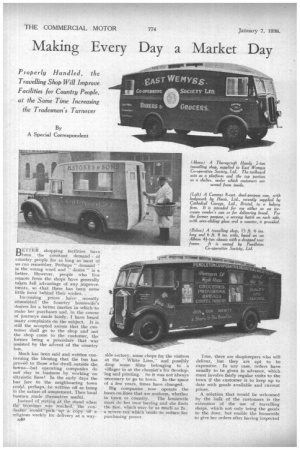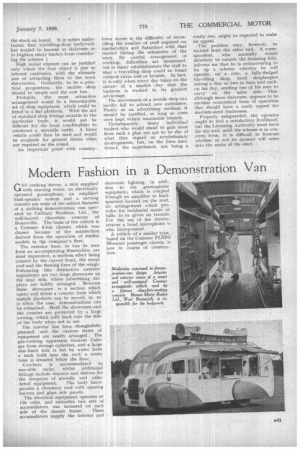Making Every Day a Market Day
Page 24

Page 25

If you've noticed an error in this article please click here to report it so we can fix it.
Properly Handled, the Travelling Shop Will Improve Facilities for Country People, at the Same Time Increasing the Tradesman's Turnover
BETTER shopping facilities have been the constant demand of country people for as long as most of us can remember. Perhaps " demand is the wrong word and " desire " is a better. However, people who live remote from the shops have generally taken full advantage of any improvements, so that there has been some
little force behind their wishes. .
increasing prices have• recently . stimulated the ountry housewife's desires for a better market in which-to make her purchases and, in the course of journeys made lately, I have heard Many complaints on the subject. It is still the accepted axiom that the customer shall go to the shop and not the shop come to the customer, the former being a prOceduie that was assisted by the advent of the country bus.
Much has been said and written concerning the blessing that the bus has proved to those who -dwell outside ,the.• towns—but operating companies do not stay in business by Working on altruistic lines! In the early days the bus fare to the neighbouring town could, perhaps, be written off as being in the nature of amuseinent. Then local busmen made themselves useful.
Instead of resting at the stand when the terminus was reached; the con
tinC;;Viir` 'would '-pieir .a::"ciipyofa • religious weekly for delivery at a wayB440
side lectory, some chops for the visitors at the "White Lion," and possibly drop 'some films belonging to a villager in at the chemist's for developing and printing. So it was not always necessary to go to town. In. the space of a few years, times have changed.
Big companies now operate the buses on lines that are uniform-, whether in town or country. The housewife must do her ownbuying. and she finds the fare, which may be as much as 2s., a seveie. tai. which 'tenth to reduce her purchasing power. True, there are shopkeepers who will deliver, but they are apt to be expensive. In any case, orders have usually to be given in advance, which must involve fairly regular visits to the town if the customer is to keep up to date with goods available and current prices.
A solution that would be welcomed by the bulk of the customers is the extension of the use of travelling shope, which not only bring the goods to the door, hut enable the housewife to give her orders after having inspected the stock on board. It is rather unfortunate that travelling-shop bodywork -has tended to become so elabOrate as to frighten many traders from considering the scheme.
High initial expense can be justified only where the true object is just to interest customers, with the ultimate aim of attracting them to the town showrooms, Ordinarily, to be a-practical proposition, the mobile shop should be simple and the cost low.
Probably, the most attractive arrangement would be a demountable set of shop equipMent, which could be fitted to a flat platform. • With the aid of standard shop fittings suitable to the particular trade, it • would not be difficult for the local coachbuilder to construct a movable outfit. A hired vehicle could then be used. and would he available for general duties when not required on the round.
An important point with country
town stores is the difficulty of reconciling the number of staff required on market-days and Saturdays with that needed during the remainder of the week. B careful arrangement of working, difficulties are minimized, but in many establishments the staff to man a travelling shop could be found without extra cost or trouble. In fact, it is only when every day takes on the nature of a market day that the business is worked to its greatest ad vantage.
The movements of a mobile shop can hardly fail to attract new customers. Purely as an advertising medium it should be justified, so I long as costs were .kept .within reasonable bounds.
Unfortunately, many individual traders who would stand to gain most from such a plan are apt to be shy of what they regard as revolutionary developments, but, on the lines mentioned, the experiment, not being a costly one, might be expected to make an appeal.
The problem may, however, be tackled from the other end. A correspondent, who normally would definitely be outside the licensing fold, informs me that he is endeavouring to fix up a scheme whereby he will operate, on a rota, a fully-fledged travelling shop, local shopkeepers taking a day or two in turn and each, on his day, sending one of his men to carry on the sales side. This, although more elaborate, appears to be another economical form of operation that should have a ready appeal for medium-sized businesses.
Properly safeguarded, the operator ought to find a satisfactory livelihood, but the Licensing Authority must have his say and, until the scheme is in concrete form, it is difficult to forecast whether or not its sponsor will enter into the ranks of the elect.
































